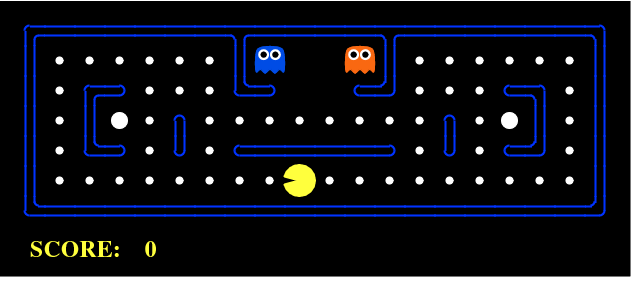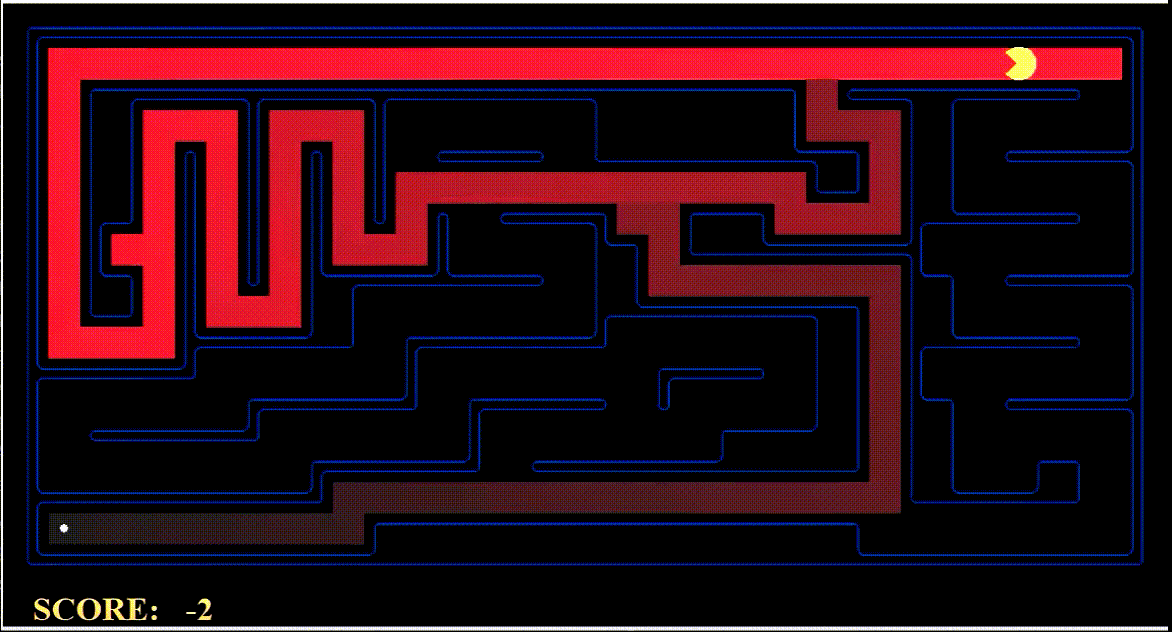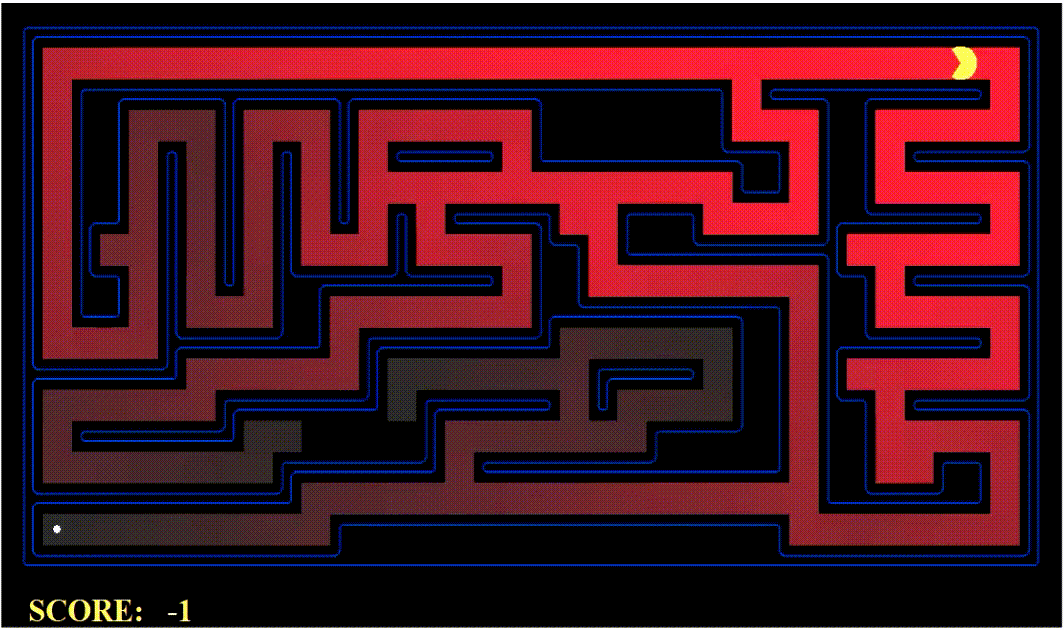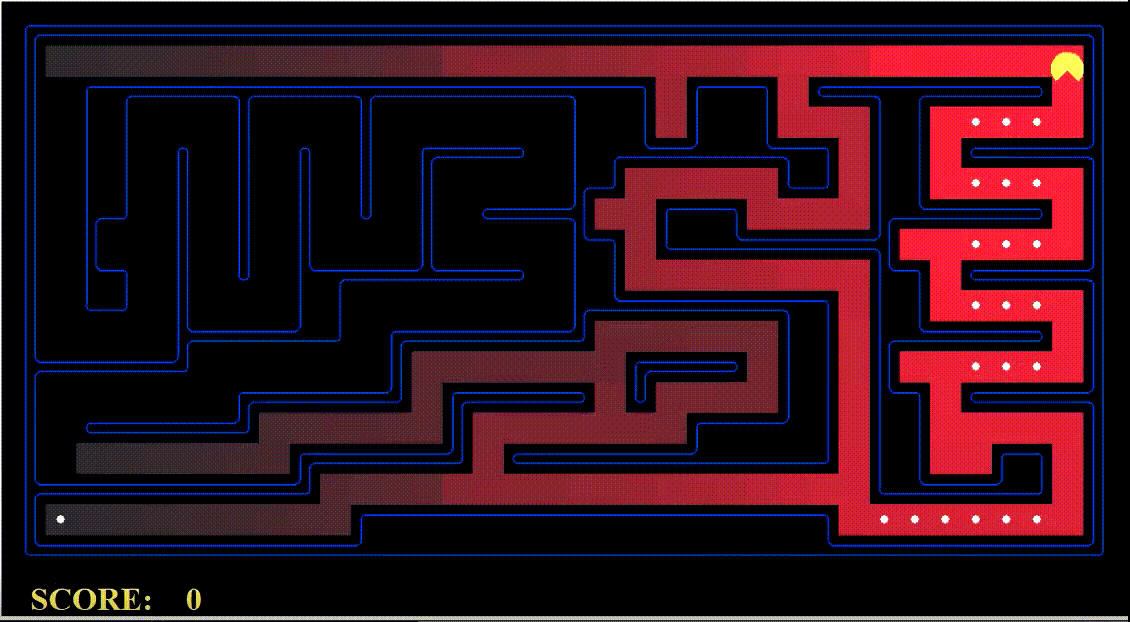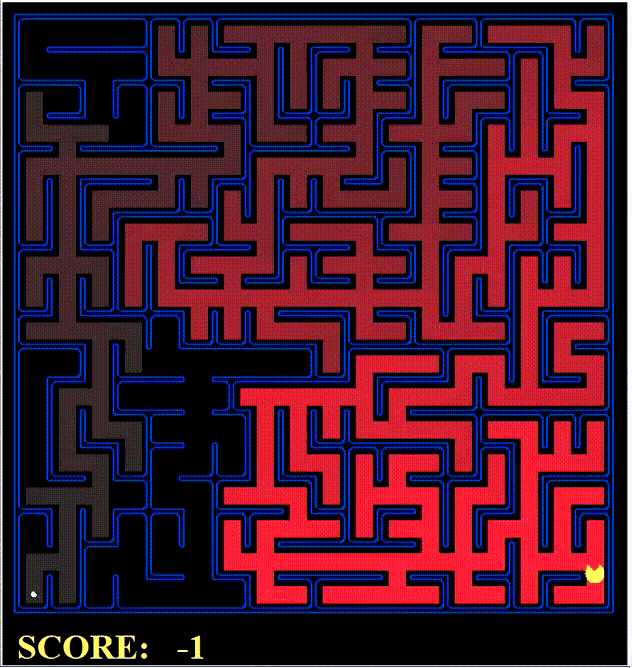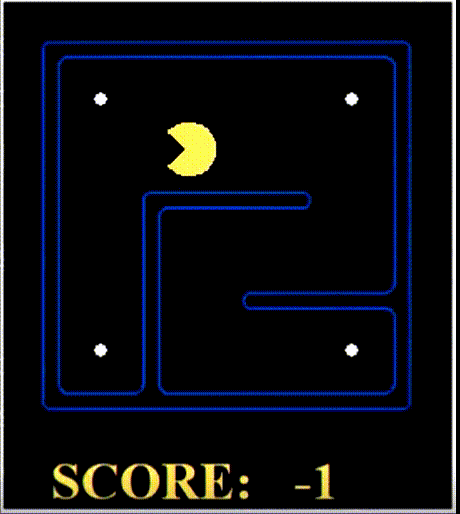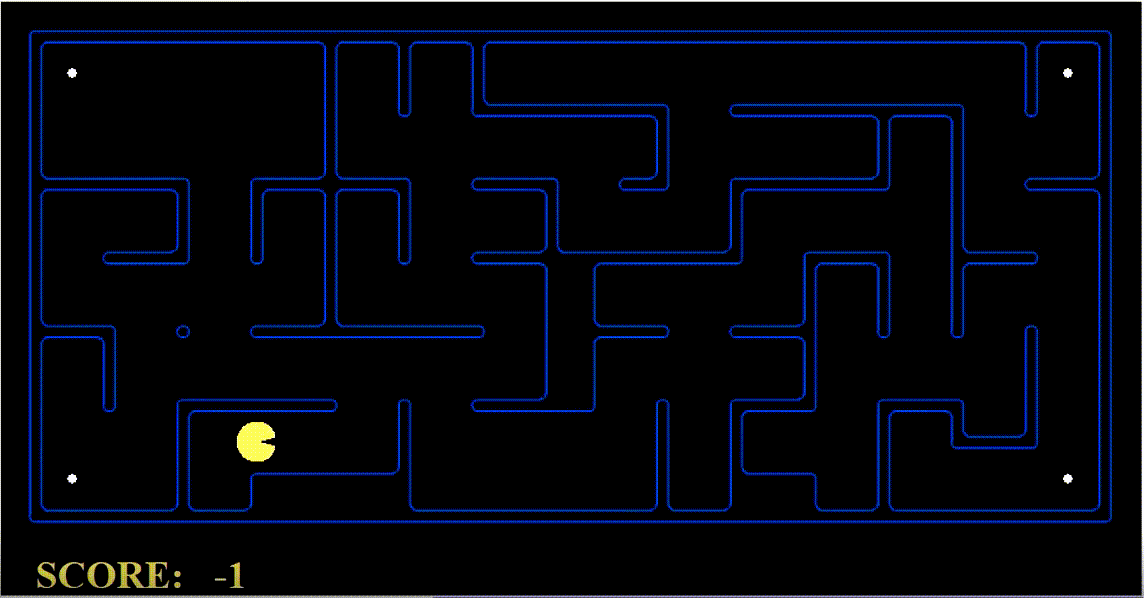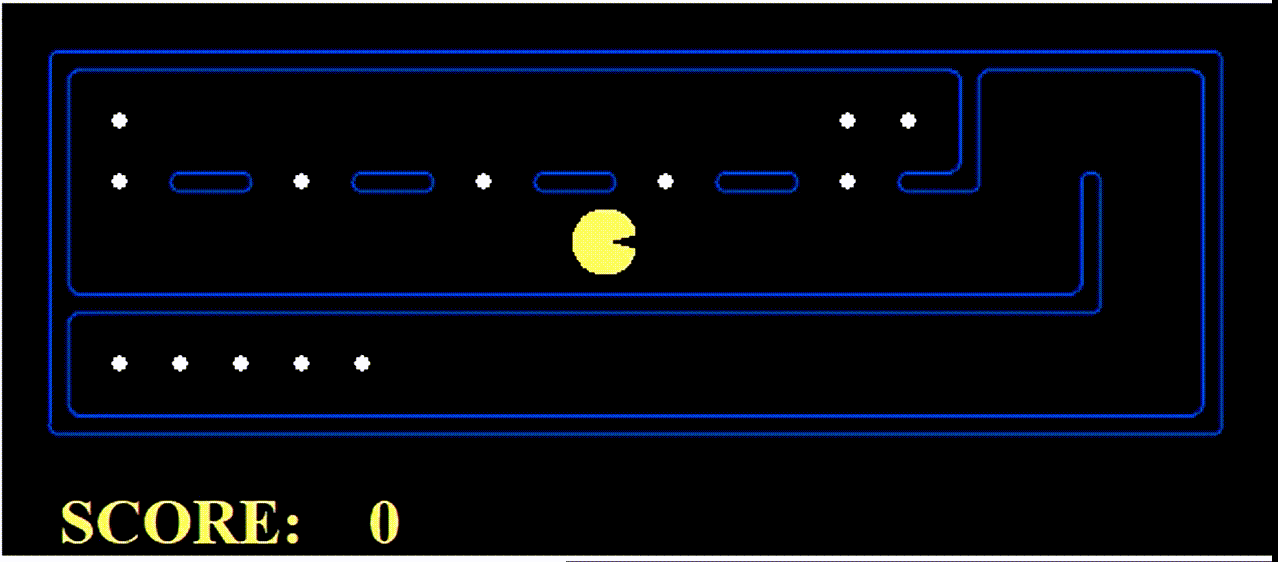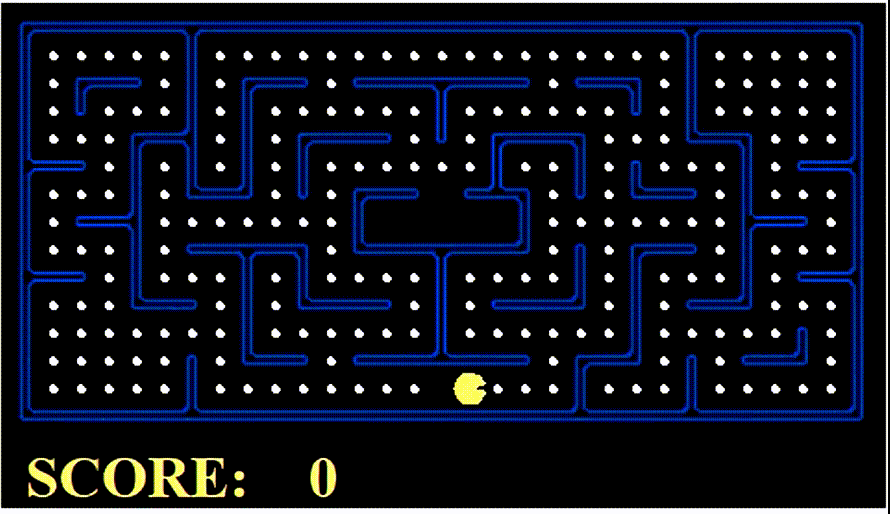Project Assignment 1 - Concordia University (Winter 2020)
Table of Contents
- ➤ About The Project
- ➤ Overview
- ➤ Project Files Description
- ➤ Getting Started
- ➤ Scenario 1: Depth First Search
- ➤ Scenario 2: Breadth First Search
- ➤ Scenario 3: Uniform Cost Search
- ➤ Scenario 4: A* search algorithm
- ➤ Scenario 5: Finding All Corners
- ➤ Scenario 6: Admissible and Consistent Heuristic
- ➤ Scenario 7: Eating All Dots
- ➤ Scenario 8: Suboptimal Search
- ➤ References
- ➤ Credits
For those of you not familiar with Pacman, it's a game where Pacman (the yellow circle with a mouth in the above figure) moves around in a maze and tries to eat as many food pellets (the small white dots) as possible, while avoiding the ghosts (the other two agents with eyes in the above figure). If Pacman eats all the food in a maze, it wins.
In this project, the Pacman agent will find paths through his maze world, both to reach a particular location and to collect food efficiently. I implemented general search algorithms such as depth-first, breadth-first, uniform cost, and A* search algorithms which are used to solve navigation problems in the Pacman world.
- search.py - Where all of the search algorithms reside.
- searchAgents.py - Where all of the search-based agents reside.
- pacman.py - The main file that runs Pacman games. This file also describes a Pacman GameState types.
- game.py - The logic behind how the Pacman world works.
- util.py - Useful data structures for implementing search algorithms.
- graphicsDisplay.py - Graphics for Pacman.
- graphicsUtils.py - Support for Pacman graphics.
- textDisplay.py - ASCII graphics for Pacman.
- ghostAgents.py - Agents to control ghosts.
- keyboardAgents.py - Keyboard interfaces to control Pacman.
- layout.py - Code for reading layout files and storing their contents.
- autograder.py - Project autograder.
- testParser.py - Parses autograder test and solution files.
- testClasses.py - General autograding test classes.
- test_cases/ - Directory containing the test cases for each scenario.
- searchTestClasses.py - Project specific autograding test classes.
You are able to start the game by typing the following commands in the command line:
$ python pacman.pyYou can see the list of all options and their default values via:
$ python pacman.py -hcommands.txt, for easy copying and pasting.
I have implemented the depth-first search (DFS) algorithm in the depthFirstSearch function in search.py.
The Pacman will quickly find a solution via running the following commands:
$ python pacman.py -l tinyMaze -p SearchAgent$ python pacman.py -l mediumMaze -p SearchAgent$ python pacman.py -l bigMaze -z .5 -p SearchAgentI have implemented the breadth-first search (BFS) algorithm in the breadthFirstSearch function in search.py.
I wrote a graph search algorithm that avoids expanding any already visited states.
The Pacman will quickly find a solution via running the following commands:
$ python pacman.py -l mediumMaze -p SearchAgent -a fn=bfs$ python pacman.py -l bigMaze -p SearchAgent -a fn=bfs -z .5I have implemented the uniform-cost graph search (UCS) algorithm in the uniformCostSearch function in search.py.
While BFS will find a fewest-actions path to the goal, UCS will find paths that are “best” in other senses.
UCS agents differ only in the cost function they use.
The Pacman will quickly find a solution via running the following commands:
$ python pacman.py -l mediumMaze -p SearchAgent -a fn=ucs$ python pacman.py -l mediumDottedMaze -p StayEastSearchAgent$ python pacman.py -l mediumScaryMaze -p StayWestSearchAgentI have implemented the A* graph search algorithm in the aStarSearch function in search.py.
I used Manhattan distance as the heuristic function.
A* finds the optimal solution slightly faster than Uniform Cost Search.
The Pacman will quickly find a solution via running the following command:
$ python pacman.py -l bigMaze -z .5 -p SearchAgent -a fn=astar,heuristic=manhattanHeuristicI have implemented a search algorithm in searchAgents.py that helps Pacman agent to find the shortest path through the maze that touches all four corners.
The Pacman will quickly find a solution via running the following commands:
$ python pacman.py -l tinyCorners -p SearchAgent -a fn=bfs,prob=CornersProblem$ python pacman.py -l mediumCorners -p SearchAgent -a fn=bfs,prob=CornersProblemI have implemented a non-trivial non-negative consistent heuristic function that returns 0 at every goal state and never returns a negative value.
This function is both Admissible and Consistent and has been written in searchAgents.py.
The Pacman will quickly find a solution via running the following command:
$ python pacman.py -l mediumCorners -p AStarCornersAgent -z 0.5I have implemented a heuristic function that helps Pacman agent to eat all the food in as few steps as possible.
The Pacman will quickly find a solution via running the following command:
$ python pacman.py -l trickySearch -p AStarFoodSearchAgentIn this scenario, I have implemented a function that helps Pacman agent to find a path to the closest dot.
This function has been written in searchAgents.py
The Pacman will quickly find a solution via running the following command:
$ python pacman.py -l bigSearch -p ClosestDotSearchAgent -z .5Mohammad Amin Shamshiri
Acknowledgements: Based on UC Berkeley's Pacman AI project, http://ai.berkeley.edu

